Social media marketing for healthcare enables providers to engage with patients, promote new relationships, and improve the brand reputation and credibility of doctors.
Given that the healthcare marketing landscape is constantly evolving, social media plays an even bigger role. It serves as a tool for healthcare providers to share information, engage with the public, promote health behaviors, discuss policy and practice issues, and educate patients and caregivers alike.
Let’s look at some numbers that help describe the importance of social media marketing for healthcare:
- 57% of patients decide where to get treatment based on a provider’s social media presence.
- 80% of Internet users who engage on social media are specifically looking for health information, and nearly half are searching for information about a specific doctor or health professional.
- 32% of US users post about their friends and family’s health experiences on social media.
- 60% of doctors feel that social media marketing helps improve the quality of care they give patients.
Social Media Marketing for Healthcare: Tips and Tricks
Here are some social media marketing ideas for healthcare to help improve your presence, aid your brand reputation management efforts, and strengthen your relationships with patients.
- Establish protocols for communicating on social media
- Educate your audience
- Combat misinformation
- Answer questions and respond to inquiries
- Showcase frontliners and people on your team
- Leverage patient reviews as testimonials
- Aim to comfort and inspire
- Understand the patient experience
Establish Your Social Media Communication Protocol
One of the challenges facing healthcare marketers is determining how their social media efforts can affect patient privacy and compliance with rules and regulations like HIPAA.
This can be easily overcome as long as you have a well-thought-out social media protocol in place. Make sure you establish a solid set of guidelines when communicating on social media. Be sure to consult with your PR and legal teams as you develop your protocol.
It’s also important to have a system and point person in place for how to respond to negative reviews, comments, and questions on social media. If you’re sharing health tips, industry trends, and medical information online, first talk to experts and researchers on your team before you hit “Publish.”
A communication protocol will help you use social media with due care and diligence, without running into privacy issues, compliance concerns, and other things that could get in the way of your efforts.
Read more: The Guide to Crafting HIPAA-Compliant Review Responses
Use Social Media to Educate Your Audience
Social media marketing for healthcare can improve your brand reputation. It can also help make you more trustworthy in the eyes of healthcare consumers.
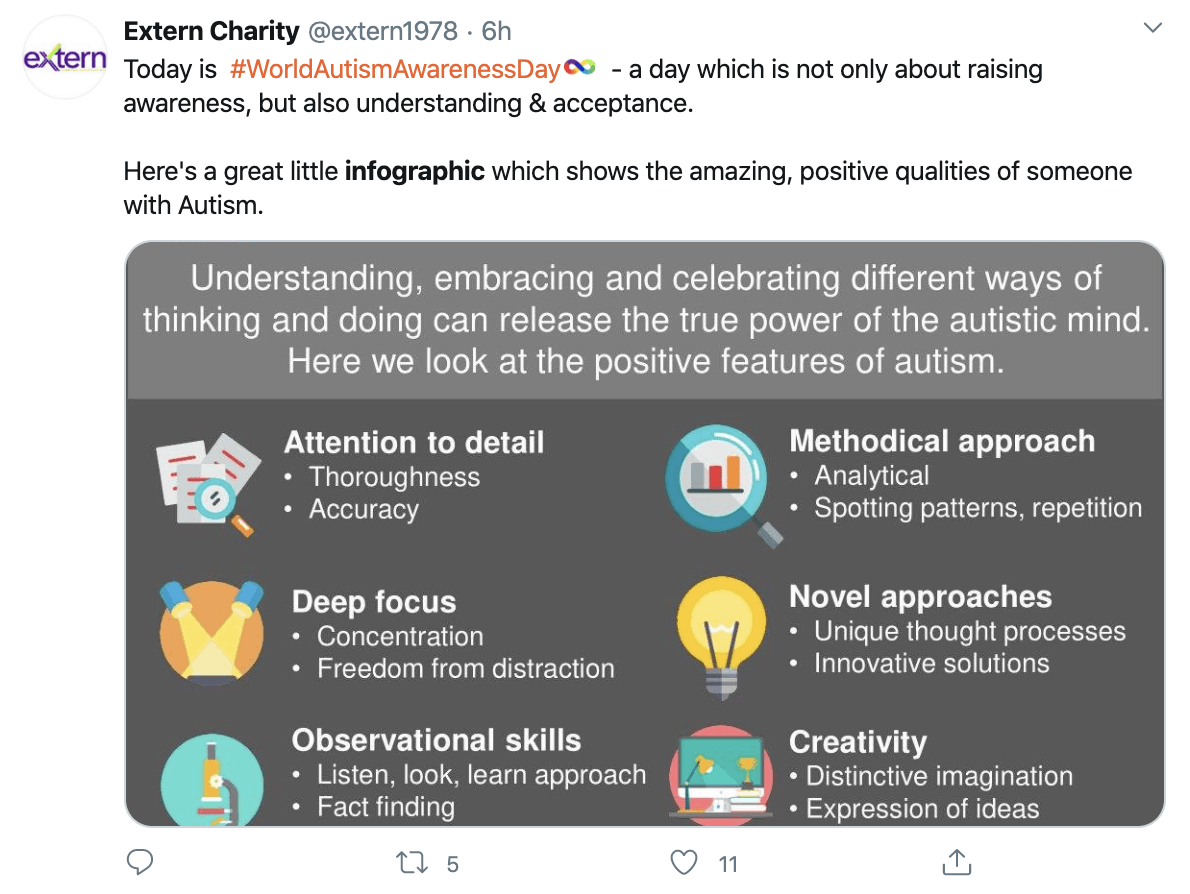
But be careful not to be overly promotional and tout your practice too much. Use social media to educate your audience, too. Become a leading source of helpful information for them.
- Spread the word about important health and medical issues.
- Join awareness campaigns and social media conversations on what’s happening in the industry.
- Create PowerPoint slides or infographics that make complicated health information easier to understand.
- Provide relevant and useful content to your audience in ways that inspire and encourage them to take part in wellness and improve their quality of life.
By following these tips, you can more easily foster trust-based relationships with patients, while also drawing attention back to your practice or brand.
Combat Misinformation
Information spreads quickly on social media. There will be times when it’s not true.
As a healthcare provider, you can demonstrate thought leadership and expertise by combating misinformation and focusing on posting content that is fact-based, relevant, clear, and meaningful.
When posting educational content, be sure to cite credible sources, published research studies, or reputable news organizations, particularly when sharing health information or promoting health behaviors. Remember: people look to health organizations for trusted information on new and emerging health concerns.
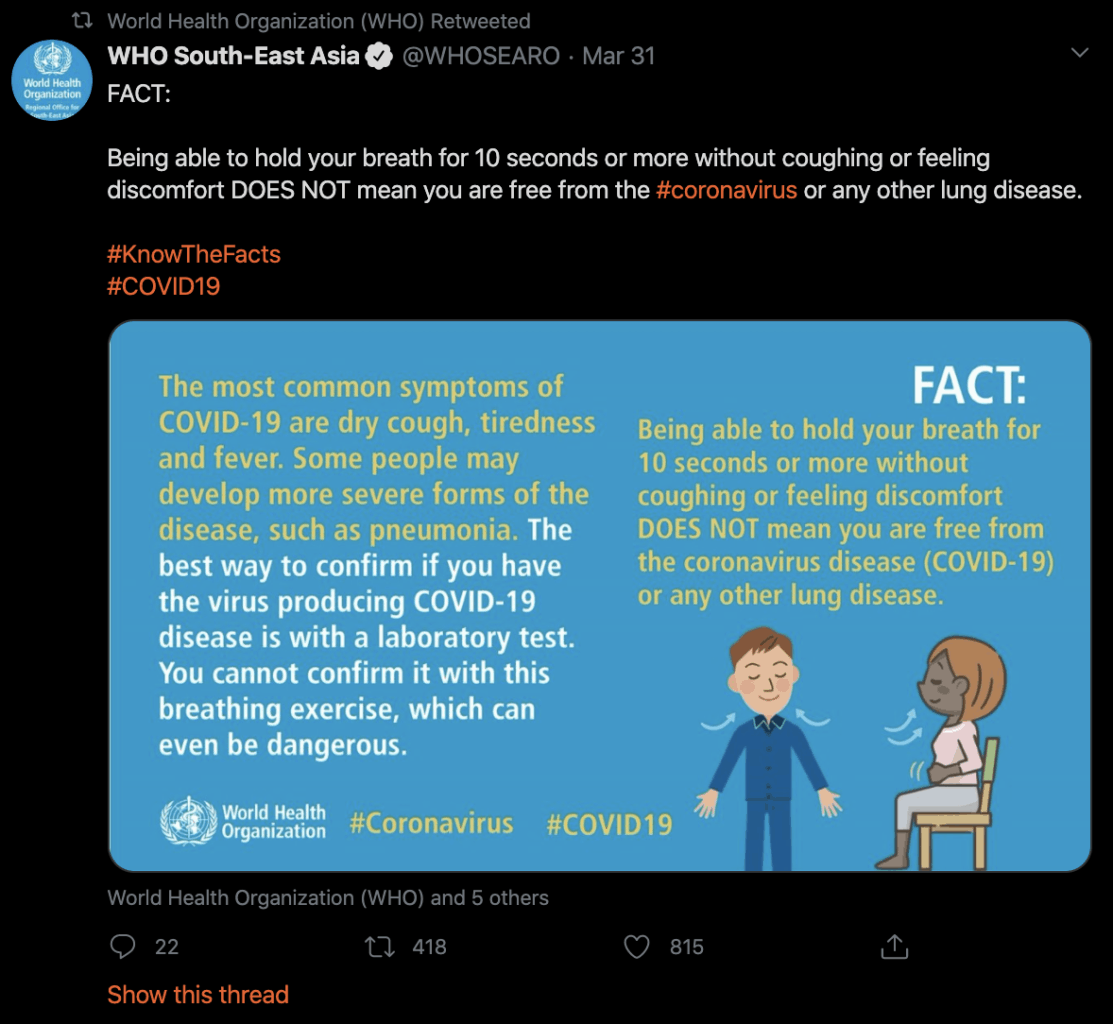
Answer Questions and Respond to Inquiries
One of the most effective ways to bolster your social media presence and improve patient satisfaction is to stay responsive to your fans and followers.
As a healthcare provider, you’ll likely get a lot of questions, inquiries, comments, unsolicited feedback, and online reviews. It’s important that you do not ignore these. Make sure you are always ready to engage with the voice of the patient.
Answer questions posted on social media comments and forums. Monitor and learn how to respond to negative reviews as well as positive feedback posted on websites like Vitals and Healthgrades. Share links to studies or blog posts that could be of use to your community of followers. You can even host a Facebook Live stream or Instagram or Twitter Q&A in order to connect with your followers and address their most pressing questions.
If you’re an organization representing multiple healthcare providers, you can improve your responsiveness and drive efficiency by investing in healthcare reputation management software.
Use Social Media to Showcase Frontliners and People on Your Team
A lot of healthcare content on social media can come off as a bit sterile. To combat this, it’s important that you’re able to show some personality and humanize your organization.
One great way to do this is by introducing your social media audience to your doctors, nurses, paramedics, and administrative staff: the people who deal with patients every day. After all, they’re the face of your organization. During health crises, they are the people from whom the public will seek support and advice.
Talk about your frontliners’ experience, achievements, and skills. Post pictures of them in their element, or while helping patients or participating in a community activity or event. This adds a measure of humanity to your healthcare practice, making you more relatable to your community of fans and followers.
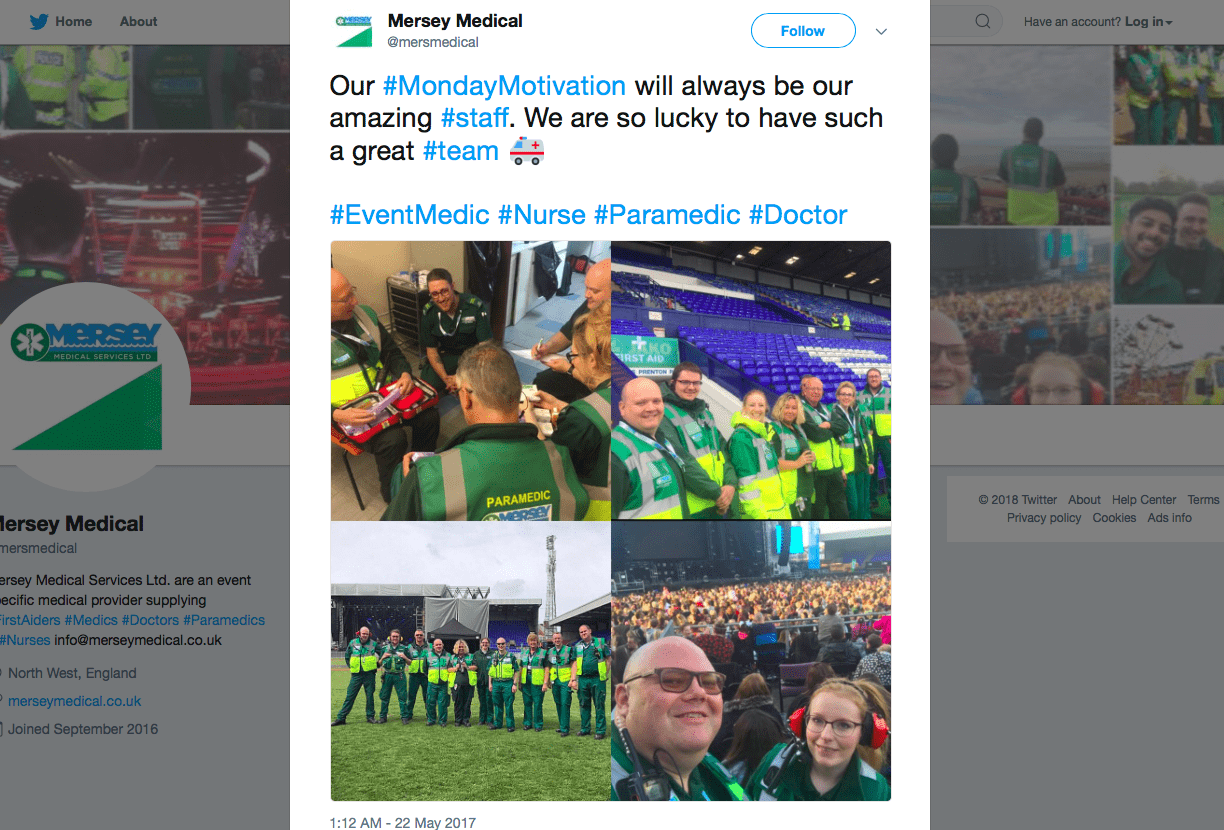
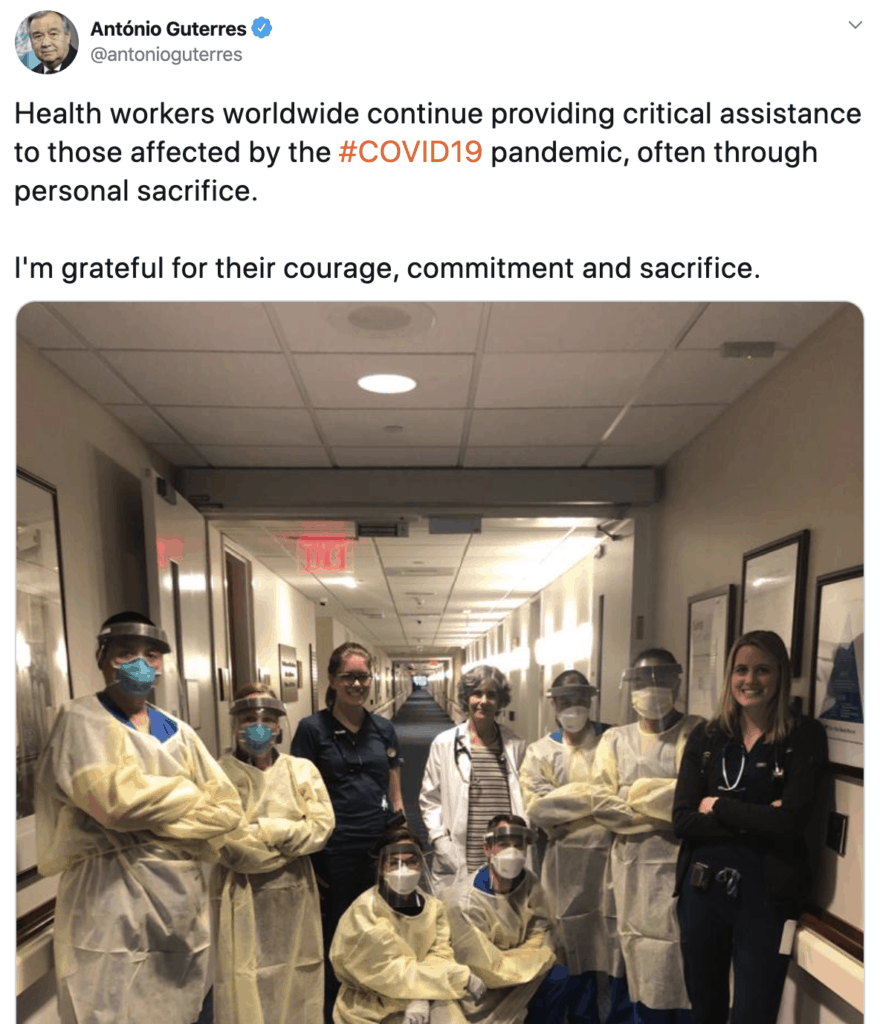
Leverage Patient Reviews as Testimonials
Online reviews posted by your patients can serve as powerful social proof for other healthcare consumers. According to research:
- 72% of consumers use online reviews as the first step to finding a new doctor (Software Advice).
- 59% of consumers see online reviews from patients as a contribution to their decision when it comes to choosing a doctor, dentist, or other healthcare provider (PatientPop).
- 70% feel it “very” or “moderately” important for providers to respond publicly to reviews (Software Advice).
Don’t hesitate to share your best reviews and testimonials on social media as well as on your website. You can use a review widget like Amplify to showcase reviews on your website.
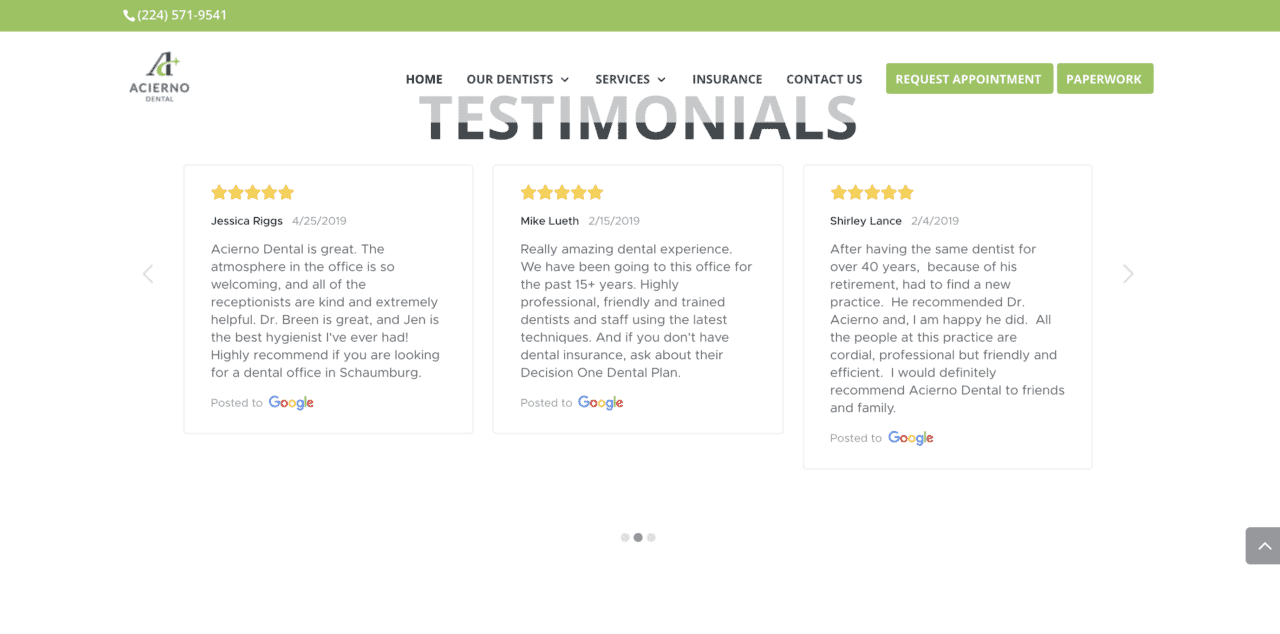
You can even create video testimonials from patients who are happy with their experience. Of course, always make sure that you are in compliance with HIPAA guidelines and ask permission for any information you want to share.
Harnessing the power of online reviews will help you improve patient access, boost patient acquisition, and enhance your brand reputation on social media.
- “More than ever, people are turning to the Internet — even if they’ve been given a referral — and we want to make sure we’re setting a great first impression. If potential patients go online and find no reviews or worse, negative reviews without an acknowledgment from the business — they are going to go elsewhere and our marketing dollars will be wasted.” – Stacy Medema, DecisionOne Dental
Aim to Comfort and Inspire
In the face of a health problem, minor or major, patients could often use a dose of comfort and inspiration.
Social media is an amazing platform for healthcare marketers to comfort, inspire, and display empathy. Use this opportunity to demonstrate the kind of patient experience you’re delivering. Show off your efforts to make patients feel as comfortable as possible under the circumstances.
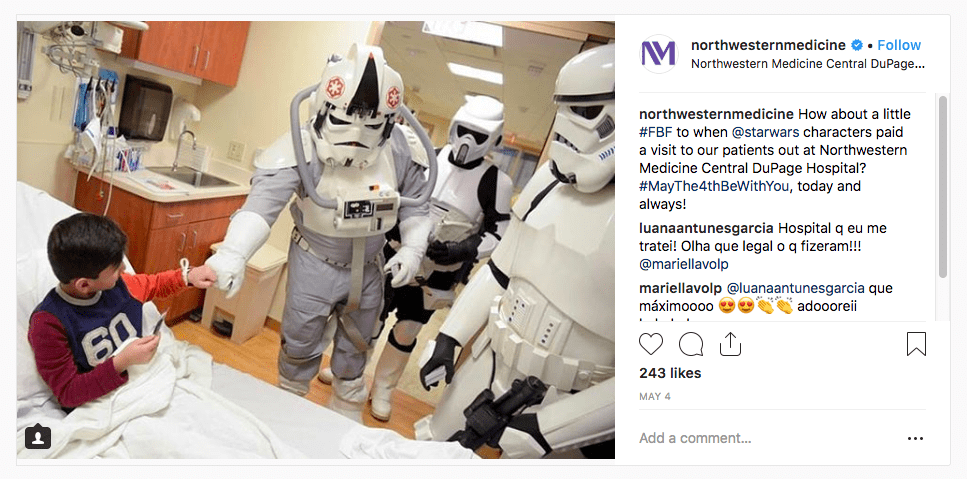
Use Social Media to Understand the Patient Experience
Online reviews, comments, patient questions, and other forms of user-generated content often offer instant feedback on the patient experience, along with ideas for innovation.
Healthcare providers can leverage this information to improve operations. Appropriately utilized, social media can transform your entire organization and exert a bottom-line impact through reduced costs, increased efficiencies, and better experiences that meet the needs of today’s healthcare consumers.